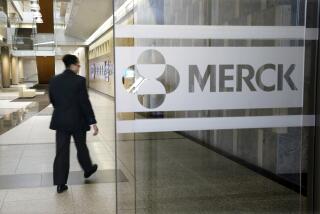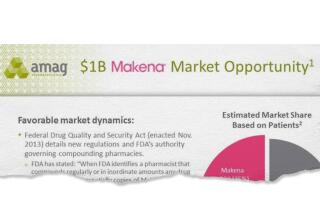Arthritis Drug Vioxx Pulled; Risk of Heart Attacks Is Cited
Merck & Co. voluntarily withdrew its blockbuster arthritis drug Vioxx from the market Thursday after a new study showed that it nearly doubled the risk of heart attacks and strokes among people taking it for at least 18 months or longer.
The loss of the drug, which has worldwide sales of nearly $2.5 billion per year, represents a major financial setback for Merck, which lost almost $27 billion in stock market value in a matter of hours.
Physicians recommended that patients taking the drugs -- about 2 million worldwide -- talk to their doctors and switch to other medications. Merck said it would set up a program to buy back unused supplies of Vioxx.
“We are taking this action because we believe it best serves the interest of patients,” Merck Chairman Ray V. Gilmartin said in announcing the recall.
Although the timing of the announcement was unexpected, the withdrawal does not come as a complete surprise because “earlier studies had already raised this concern,” said Dr. Gregg C. Fonarow, a cardiologist at UCLA Medical Center. “There was already a movement away from Vioxx, but there are still a large number of people being treated with it.”
Experts said the risk of life-threatening events was small and that the findings probably did not apply to other members of the class of drugs called Cox-2 inhibitors. Nonetheless, the Food and Drug Administration said Thursday that it would reexamine all similar drugs on the market and could require additional data for new drugs in the same class.
The Merck announcement sent many patients to their physicians in fear for their health and their ability to control severe pain.
“If you get off Vioxx and still have pain, there are five to seven other [drugs] that people need to work their way through to find something that is effective,” said Dr. Steven Abramson of the New York University School of Medicine.
The most immediate beneficiary will be Pfizer Inc.’s Cox-2 inhibitor Celebrex, which is projected to have worldwide sales of at least $3.3 billion this year. Pfizer also has a second-generation drug called Bextra, which has projected sales of about $600 million, and Merck has a second-generation drug called Arcoxia that has been approved in 47 countries but is awaiting approval from the FDA.
The FDA had delayed its decision on Arcoxia because of earlier concerns about Vioxx, and the new results seem likely to delay it further and make it more difficult for other drugs of the class to reach the market, experts said.
In particular, the agency seems likely to require longer clinical trials before approval, because the new risks did not develop until after 18 months of use. But the FDA has not decided how it will approach the problem, said John Jenkins, director of the FDA’s office of new drugs.
The agency requires trials of six to 12 months for drugs treating chronic diseases, he said, adding that “it is difficult to ask an arthritis patient who has inflammation and pain to remain in a longer-term, placebo-controlled trial.”
Steve Galson, acting director of the FDA’s Center for Drug Evaluation and Research, said: “I am sure we are going to ask for more data, but I can’t tell you exactly what that data is.”
Cox-2 inhibitors have been extremely popular since they were first introduced in 1999. Their chief advantage is that, unlike aspirin, ibuprofen and other over-the-counter drugs for inflammation, they do not cause gastrointestinal bleeding. Their principal drawback is cost, about $3 per day, compared with about 3 cents per day for aspirin or ibuprofen.
In the United States, more than 84 million prescriptions for Vioxx have been written since its introduction. Most of the prescriptions are for long-term treatment of the chronic pain and inflammation of osteoarthritis and rheumatoid arthritis, but the drug is also used widely for short-term treatment of many types of pain.
To obtain FDA approval, Merck tested the drug in clinical trials involving 3,900 patients. Although the study found an increase in high blood pressure cases, there was no sign of the drug causing heart attacks. The company’s final study required for FDA approval lasted 12 months.
But a 2001 report in the Journal of the American Medical Assn. found signs that the drug might increase cardiovascular risks, and the FDA required a warning on the drug’s label.
The new findings came in a three-year study funded by Merck to determine whether Vioxx could retard the progression of colon polyps into full-blown cancer. It is the longest study of a Cox-2 inhibitor that has been conducted so far.
Merck stopped the trial prematurely Sept. 23 when the trial’s external data-monitoring board alerted the company to a potential problem. At that point, 25 of 1,299 patients receiving a placebo had suffered a heart attack (1.9%), compared with 45 of the 1,287 patients receiving Vioxx (3.5%), according to a Merck spokesman.
The number of deaths in each group was the same: five.
No one is sure why the drug triggered the heart attacks, but speculation includes an increase in blood pressure and a slight hardening of arterial walls leading to increased clot formation. There is no evidence that any of the changes are permanent, Fonarow said, and the cardiovascular risk of patients who stop taking the drugs or who took them only for short periods should return to normal.
On Wall Street, investors punished Merck’s shares, sending them down 27% to $33, off $12.07 in trading on the New York Stock Exchange.
Pfizer shares rose 42 cents to $30.60, also on the New York Stock Exchange.
Analysts were divided on how the withdrawal of Vioxx would affect sales of Pfizer’s Celebrex and Bextra. Some thought the drugs would benefit; others thought Vioxx’s demise would hurt the entire category of drugs.
“Bad news for a key product is never good news for a class of drugs,” said James Kelly, a pharmaceutical industry analyst with Goldman Sachs in New York. He noted that sales of all anti-cholesterol drugs suffered when drug maker Bayer withdrew Baycol in 2001 after it was linked to 31 deaths.
Kelly said recent drug sales showed an increased use of over-the-counter painkillers, reflecting mounting concerns about Cox-2 drugs.
Sena Lund, an analyst with Cathay Financial in New York, agreed that aspirin and other over-the-counter pain relievers would benefit. But he predicted that a “major portion” of Vioxx’s sales would go to Celebrex and Bextra.
Legal experts said Merck could face lawsuits from patients who believed they were harmed by Vioxx, but that it was too early to quantify the company’s potential liability.
Brietta Clark of Loyola Law School in Los Angeles said lawyers had already started to look for Vioxx patients on the Internet. “Clearly, a lot of people think they have got a basis for a suit,” she said.
Clark said the fact that Merck recalled Vioxx would work in the company’s favor.
Jonathan Zasloff, a UCLA law professor, said it would be difficult for plaintiffs to prove that Vioxx caused their heart attacks.
“The easiest kind of cases involve a signature disease, like asbestosis,” he said. “To show that Vioxx caused your heart attack is going to be a hard sell.”






